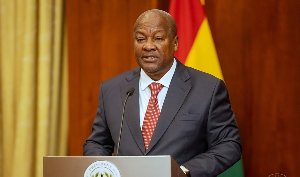Ghana is on the right track towards improving conditions in its prisons, Amnesty International Ghana has observed.
It said since 2011, the government had consistently worked towards addressing the living conditions of prisoners in the country. “This is commendable even though there is still a lot to be done,” the Director of Amnesty International Ghana, Mr Lawrence K. Amesu, said in an interview with the Daily Graphic.
He said for instance that the Ankaful prison had been completed and some prisoners had been transferred from the Nsawam Medium Security Prison to that place, thereby decongesting the Maximum Security Prison.
Mr Amesu commended the decision by the government to increase the daily feeding fee of prison inmates from GHc0.60 to GHc1.80 per inmate, saying that needed to be commended though still inadequate, considering the cost of living in the country presently.
“Also, the President, on July 1, 2013, as part of the country’s Republic Day celebration, granted amnesty to 670 prisoners, and for us, this demonstrated the President’s willingness to address concerns in our prisons,” he said.
He was particularly happy that Ghana had opened its doors to the UN Rapporteur General to visit prisons in the country and the government’s readiness to address the recommendations that followed the visit.
“We think the government should be commended, in the first place for allowing the Rapporteur General to come here to visit our prisons and secondly for agreeing to look into the recommendations coming out from the visit,” he said.
Touching on Alternative Dispute Resolution (ADR), Mr Amesu said it was the main answer to the overcrowding in the country’s prisons.
He said Ghanaians should not always rush to the law court, contending that some cases could be addressed through the ADR instead of the law court, which did not promote reconciliation.
Mr Amesu said, currently, there were a number of people on remand, awaiting trial, some of whom had been in such a situation for over six years and pointed out that the situation increased up the number of inmates.
Some of the cases, he said, could have been easily resolved through the ADR.
The Justice For All programme is an initiative under which the justices visit prisons to examine cases of remanded prisoners during which some of them are discharged to go home.
Mr Amesu was of the view that the situation in the prisons demanded that the Justice for All Programme should be encouraged and intensified to cover all prisons in the country.
He was not happy that such a laudable programme was concentrated only in the cities and said he was looking forward to seeing it expanded to all parts of the country.
On the Death sentence, Mr Amesu said Amnesty International Ghana had been campaigning to get it expunged.
He said it was commendable that for over 20 years now, nobody had been executed in Ghana, but the mere fact that it was still in the statute books of the country remained a concern.
Mr Amesu recalled that the removal of the death penalty from the statutes was part of the recommendations of the Constitutional Review Committee, and was hopeful that with the steps being taken, including the setting up of the implementation committee, it would be eventually expunged.
Regional News of Wednesday, 1 January 2014
Source: GNA












